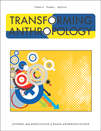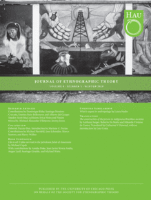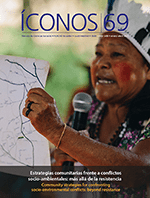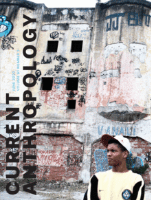
Revista de Antropologia Social
Scope & Guideline
Connecting Voices through Innovative Research
Introduction
Aims and Scopes
- Ethnographic Research and Fieldwork:
The journal prioritizes original ethnographic studies that provide in-depth insights into social practices, cultural norms, and community dynamics, often highlighting voices from marginalized groups. - Interdisciplinary Approaches:
Emphasizing the intersection of anthropology with other disciplines such as sociology, psychology, and political science, the journal encourages contributions that draw on diverse methodologies and theoretical frameworks. - Focus on Social Justice and Inequality:
A core aim of the journal is to address issues of social justice, exploring themes of power, inequality, and resistance in various social contexts, particularly in relation to marginalized communities. - Cultural and Historical Contextualization:
The journal seeks to contextualize contemporary social issues within broader cultural and historical frameworks, enabling a deeper understanding of current anthropological challenges. - Reflections on Methodological Challenges:
The journal also focuses on the methodological challenges faced by anthropologists, including ethical considerations, representational issues, and the complexities of conducting research in sensitive contexts.
Trending and Emerging
- Digital Anthropology and Online Communities:
Recent publications highlight the role of digital platforms and online communities in shaping social interactions and cultural expressions, indicating a growing interest in how technology influences human behavior. - Mental Health and Well-being:
There is an emerging focus on mental health issues, particularly in relation to cultural perceptions and practices, as well as the impact of social inequalities on mental health outcomes. - Intersectionality and Gender Studies:
The journal increasingly addresses intersectional analyses that explore the complexities of gender, race, and class, particularly in relation to social justice movements and feminist perspectives. - Sustainability and Environmental Anthropology:
Recent trends indicate a rising interest in environmental issues and sustainability, with anthropological insights into the socio-environmental impacts of globalization and climate change. - Urban Anthropology and Migration Studies:
There is a growing focus on urban spaces and migration, examining how transnational movements and urbanization affect cultural identities and social relations.
Declining or Waning
- Traditional Anthropological Methods:
There appears to be a declining focus on traditional anthropological methods that prioritize long-term fieldwork in favor of more contemporary, digital, and interdisciplinary approaches. - Narrowly Defined Cultural Studies:
The scope of cultural studies that focus solely on specific ethnic groups or isolated communities has diminished, with a shift towards broader social dynamics and transnational issues. - Historical Anthropology:
While historical perspectives were previously a strong feature, there is a noticeable reduction in studies that explore historical anthropological contexts, as current issues take precedence. - Local Community Studies:
The focus on localized community studies is waning, possibly due to the increasing interest in globalized phenomena and transnational connections that intersect with local practices. - Theoretical Rigidity:
There is a gradual decline in the use of rigid theoretical frameworks that previously dominated the field, as researchers increasingly seek flexible and adaptive methodologies.
Similar Journals

Transforming Anthropology
Elevating Anthropology through Pioneering ResearchTransforming Anthropology is a dynamic and influential journal in the field of Anthropology, published by Wiley. With an ISSN of 1051-0559 and an E-ISSN of 1548-7466, this journal has established a reputable position within academic circles, evidenced by its impressive Q2 rating in the 2023 category quartiles and a 77th percentile rank in the Scopus Ranks for Social Sciences. Since its inception, the journal has evolved to reflect contemporary anthropological discourse, addressing crucial issues from diverse perspectives. Although it does not currently operate under an Open Access model, its content remains accessible to a global readership eager to engage with pioneering research. Spanning converged years from 1990 to 1994 and 2010 to 2024, Transforming Anthropology serves as a vital platform for exploring transformative ideas and methodologies within the discipline. Researchers, professionals, and students alike can benefit from the scholarly contributions and insightful discussions fostered within its pages, making it an essential resource for anyone invested in the complexities of human culture and society.

Disparidades-Revista de Antropologia
Unlocking insights into the complexities of human society.Disparidades-Revista de Antropologia, published by CONSEJO SUPERIOR INVESTIGACIONES CIENTIFICAS-CSIC, has established itself as a vital platform for scholarly discourse within the fields of anthropology, cultural studies, and linguistics since its inception. With an Open Access policy introduced in 1996, this Spanish journal ensures that critical research is accessible to a global audience, fostering interdisciplinary dialogue and knowledge sharing. Residing in the culturally rich environment of Madrid, Spain, the journal's recent categorizations within the Q4 in Anthropology, Q3 in Cultural Studies, and Q3 in Linguistics and Language indicate its growing influence in these areas, even as its Scopus rankings reflect the ongoing challenges in enhancing its visibility and impact. Aimed at researchers, professionals, and students alike, Disparidades champions innovative approaches and diverse perspectives, making a significant contribution to the understanding of socio-cultural disparities in contemporary society. By providing an accessible forum for academic research, it plays a crucial role in advancing knowledge and scholarship across multiple disciplines.

Etnoloska Tribina
Illuminating the Depths of Culture and HumanityEtnoloska Tribina, published by the Croatian Ethnological Society, is a premier open-access journal dedicated to the fields of Anthropology and Cultural Studies, serving as a vital platform for scholars and practitioners since its inception in 1970. With an impressive impact factor reflected in its current Q3 rankings in both Anthropology and Cultural Studies, the journal continues to foster scholarly discourse and innovative research within these disciplines. As part of the Scopus database, Etnoloska Tribina ranks in the top 67th percentile for Cultural Studies, providing readers with cutting-edge explorations and critical analyses that contribute to the understanding of cultural phenomena. The journal's commitment to open access empowers a global audience in Croatia and beyond, facilitating the exchange of ideas and knowledge across borders. Researchers, professionals, and students alike can benefit from the rich and diverse array of articles that illuminate cultural identities and anthropological inquiry from 2011 to the present.

Res Publica-Revista de Filosofia Politica
Unraveling Complex Political DynamicsRes Publica-Revista de Filosofia Politica, published by the Universidad Complutense de Madrid, is a distinguished academic journal dedicated to the exploration of political philosophy and its intersection with sociopolitical frameworks. With an ISSN of 1576-4184 and an E-ISSN of 1989-6115, this journal serves as a crucial platform for the dissemination of scholarly research and discussions that engage with contemporary political issues and philosophical inquiries. The journal has achieved notable standings, ranked Q2 in Philosophy and Q3 in Sociology and Political Science for 2023, reflecting its impact and relevance in these fields. Covering converged years from 2019 to 2024, it provides accessible content through a commitment to rigor and scholarly excellence, making it an essential resource for researchers, professionals, and students who seek to advance their understanding of complex political dynamics. The journal's international scope is underscored by its proactive engagement with global political theories, enriching the academic discourse surrounding philosophy and political science.

HAU-Journal of Ethnographic Theory
Challenging Paradigms, Enriching Ethnographic Understanding.HAU-Journal of Ethnographic Theory, published by University of Chicago Press, stands as a leading platform for scholarly discourse in the field of anthropology. Established in 2011, this esteemed journal focuses on ethnographic methodologies and theoretical advancements, offering a significant contribution to the understanding of human cultures and social practices. With an impressive Q2 ranking in anthropology and a strong placement in the 63rd percentile among peers in the Scopus rankings, HAU ensures high visibility and impact within the academic community. Although the journal currently does not offer open access, it is widely available for institutions, fostering a global dialogue among researchers, professionals, and students. As it converges its content towards 2024, HAU remains dedicated to publishing innovative research that challenges existing paradigms and encourages critical reflection, solidifying its importance in the continuous evolution of ethnographic theory.

Iconos
Fostering Interdisciplinary Dialogue in Social SciencesIconos is a distinguished academic journal published by FAC LATINOAMERICANA CIENCIAS SOCIALES-FLACSO in Ecuador, with an ISSN of 1390-1249 and an E-ISSN of 1390-8065. Since its inception in 1997, Iconos has proudly maintained an open-access policy, promoting accessibility and dissemination of critical research across various disciplines. With a strong focus on Anthropology, Gender Studies, and Social Sciences, this journal has achieved a commendable standing, being categorized in the Q2 quartile in 2023 across multiple categories in these fields. Notably, it ranks #199 in Anthropology and #91 in Gender Studies, placing it in the upper percentiles of academic publishing. The journal aims to foster interdisciplinary dialogue and to illuminate socio-cultural dynamics through rigorous scholarship. With its commitment to quality, research diversity, and social relevance, Iconos serves as an essential resource for researchers, professionals, and students alike, seeking to engage with contemporary social issues from a Latin American perspective.

REPRESENTATIONS
Challenging Norms, Shaping FuturesREPRESENTATIONS, published by University of California Press, is a prominent academic journal that has made significant contributions to the fields of Arts and Humanities, Cultural Studies, Gender Studies, and Sociology and Political Science since its inception in 1983. With an ISSN of 0734-6018 and E-ISSN of 1533-855X, REPRESENTATIONS is recognized for its rigorous scholarship and critical discourse, currently positioned in Q2 within its primary categories and holding respectable ranks in Scopus, reflecting its influence and relevance in contemporary academic conversations. Designed for a diverse audience including researchers, educators, and students, this journal facilitates an interdisciplinary dialogue that addresses pressing societal issues through various scholarly lenses. While not openly accessible, its articles are invaluable for those seeking in-depth analysis and innovative perspectives. For continued engagement with critical scholarship through 2024 and beyond, REPRESENTATIONS serves as an essential platform for enriching the discourse surrounding cultural and social inquiries.

Revista Pos Ciencias Sociais
Empowering researchers to address societal challenges.Revista Pos Ciencias Sociais, published by UNIV FED MARANHAO, CENTRO CIENCIAS HUMANAS, is an esteemed open access journal in the field of social sciences that has been disseminating knowledge since 2004. With the ISSN 1983-4527 and E-ISSN 2236-9473, this journal aims to foster critical discourse and innovative research that address pressing social issues in Brazil and beyond. Although specific metrics like the H-index and Scopus ranks are currently unavailable, the journal remains committed to advancing the field through peer-reviewed articles, comprehensive reviews, and empirical studies. Accessible to a global audience, Revista Pos Ciencias Sociais serves as a vital platform for researchers, professionals, and students dedicated to exploring and addressing the complexities of human society while enriching the academic community with diverse perspectives.

SOCIOLOGICAL PERSPECTIVES
Advancing sociological inquiry through innovative research.Sociological Perspectives is a premier academic journal published by SAGE Publications Inc that serves as a vital platform for the dissemination of high-quality research in the fields of sociology and political science. Established in 1958, the journal has become a crucial resource for scholars, professionals, and students alike, actively contributing to the evolution of sociological thought and understanding. With its robust Q1 quartile ranking in both Sociology and Political Science as of 2023, it stands at the forefront of academic discourse, fostering interdisciplinary dialogue and innovative perspectives. Dedicated to ensuring academic rigor and relevance, the journal prioritizes articles that address contemporary social issues, theoretical advancements, and methodological innovations. While currently not offering Open Access, it remains accessible through various institutional subscriptions, enriching the academic community with insights that challenge conventional paradigms and encourage thoughtful engagement with emerging social phenomena. Situated in the heart of the United States, specifically at 2455 Teller Rd, Thousand Oaks, CA 91320, Sociological Perspectives continues to shape the future of sociological inquiry and influence policy and practice.

CURRENT ANTHROPOLOGY
Advancing the Frontiers of Human UnderstandingCURRENT ANTHROPOLOGY, published by the esteemed University of Chicago Press, stands as a premier journal in the fields of anthropology and archaeology, with an impressive impact factor that signifies its relevance and authority in the academic community. With both print (ISSN: 0011-3204) and digital formats (E-ISSN: 1537-5382), this journal provides a platform for groundbreaking research, theoretical advancements, and critical discussions that shape our understanding of human cultures and societies. Since its inception in 1962, CURRENT ANTHROPOLOGY has continually pushed the boundaries of knowledge and inquiry, earning a prestigious Q1 ranking in 2023 across multiple categories, including Social Sciences and Archaeology. Researchers and professionals alike rely on this journal not only for its rigorous peer-reviewed articles but also for its commitment to interdisciplinary approaches and innovative methodologies. While not currently offering open access, CURRENT ANTHROPOLOGY remains an essential resource for students and scholars eager to stay abreast of the latest developments in anthropological research.